The Processor or CPU
The Brain
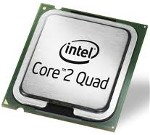
Although this is the most important part of the computer, as in the real brain, most of us don't use that much if it anyway so don't fret of how fast your CPU is. These days, every computer comes with enough brain power for most of us. If you are buying a computer now, a Dual Core CPU is plenty (Two Brains). The Quad shown above is for hard-core gamers.
Memory
The Desk - Technical Term: RAM (Random Access Memory)
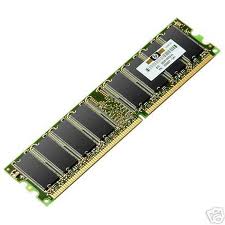
Memory is a little more important than to make your computer run fast. Why? Like a brain, the memory is instant. If you remember how to do something, you do it. If it not in your memory, you have to look it up. The bigger the memory, the more things you don't have to look up. So if your computer is doing many things at once, all the programs can run in memory instead of having to look them up. If you don't have enough memory, your CPU does all the work of moving stuff back and forth from memory to the filing cabinet.
Disk Storage
The Filing Cabinet Technical Term: Hard Drive
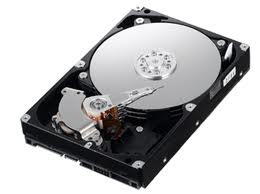
The Hard Drive is where basically everything is stored. It is your filing cabinet for everything you want to eventually look at. Depending on what you are storing, you will need to size this accordingly. More on this in the file type section. Hard drives spin at a very high speed, have mechanically moving parts and eventually they can burn out making backups very important. Newer technology is the Solid State hard drive which have no moving parts but a much more expensive per gigabytes of storage. The price may drop enough to phase out mechanical hard drives completely as it is much faster and more reliable.
A Display Unit -
Technical Term: Monitor
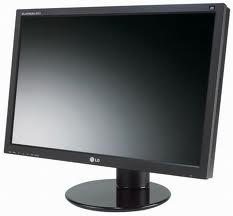
The size (or resolution) of the monitor determines how much you can see at the same time or how big you want to see things. On a laptop, the monitor is built in so the size is predetermined by the laptop you have.
A keyboard and/or a mouse
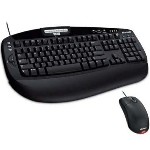
How you tell the computer what to do. On a laptop, the mouse can be a touch pad. Your keyboard can do a lot more than typing. We will do part of a session explaining how a keyboard can speed up how you use your computer. Go to keyboard page.
A CD/DVD Drive - No
real technical term
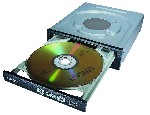
This drive is often used to install software, a process that will eventually be replaced by downloading. You can also use this to take 'small' backups of you data by 'burning' CD's or DVD's with your files on them. You can also use it watch DVD movies or listen to CD's. Some drives make enough noise that you won't want to use it for listening to music but you will be able to copy music from a CD to your computer. This requires a full lesson in itself.
USB Ports - Non
Technical Term: Slots you plug things into
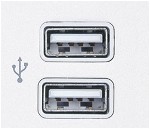
These slots allow you to plug
in accessories like cameras, printers and even coffee warmers. USB ports
have made almost all other connection types obsolete as they are fast
(and getting faster) and usually the plugged-in device is automatically
recognized. You also plug in your dongles in there. More on dongles
later.
USB ports carry a small voltage that have enough power to make some
portable hard drives work without plugging them in. There are even
external keyboard lights that use the USB port to light up your laptop
keys.
Other things you will
probably need or may have if you own a laptop
A Printer / Scanner
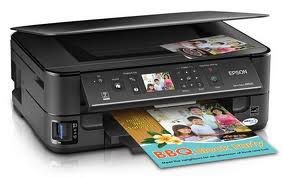
Unless you want your friends or children to print everything for you, you will need a printer. Unfortunately, a printer is way harder to operate than a computer. I don't mean harder to use but there are many things that can go wrong with a printer and it uses very expensive ink. If you are buying a printer because you want to print you own pictures at home, it will cost you 2 to 4 times more than going to your pharmacy. That is if it works the first time and doesn't waste photo paper. It is very convenient to be able to print things at home but printers cause many headaches. New all in one printers are easy to use and you don't even have to always have them connected to your computer. You can use them as photocopiers with the press of a button. During the course, an entire session will be devoted to the use of all in one printers. All-in-one printers that I am talking about include printing, scanning and copying not faxing. That will be explained also.
An External Hard Drive
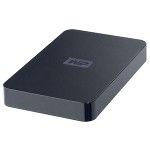
Although I have listed this as optional
equipment, this is the easiest way to make sure you never lose any
important things on your computer. If you use an external drive to back
up your data, if your computer breaks down or even gets lost or stolen,
your external hard drive will have all the data on it from the time you
did your last backup (another complete session on back up and restore).
If you only use you computer to browse the web and do e-mails, you can
get away from getting an external hard drive.
A WebCam*
The items marked with a * are probably already on
your laptop
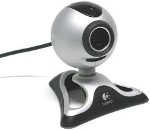
You don't really need a Webcam to use Skype but it seems more polite to also be seen as you are looking the other other person you are talking to. Webcams usually have microphones built-in to them so you don't need a microphone.
Speakers*

Your only really need external speakers if you are going to watch videos or listen to music on your computer. Some desktop computers even have integrated speakers and your monitor may have them too.
A
microphone*

Like I said before, if you have a webcam it's
probably incorporated but older webcams might not have mikes.
Access to
the internet (either Wired or Wireless*)

Most laptops can access the internet through Wi-Fi this whole topic needs at least one session to describe so you will have to wait.
Memory Card Reader*

Both your laptop or desktop computer probably have these slots for reading cards from cameras. Sometimes it's faster to pop these in to the computer rather that trying to find the wire for the camera. The will be an entire session of photos, videos and cameras.